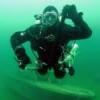
Trouble with weights
#1

Posted 07 May 2004 - 10:01 PM
~Jacques Cousteau
#2

Posted 07 May 2004 - 10:34 PM
If you sink like a rock on exhalation, you are overweighted. Even with the five pounds you will sink relatively slowly at first. Judging this will come from experience from what I have seen.
The key to this is fully exhale the full volume in your lungs to judge this. Blow out hard to start your descent. In the end, your lungs will be your best BC anyways.
#3

Posted 07 May 2004 - 10:39 PM
~Jacques Cousteau
#4

Posted 08 May 2004 - 12:05 AM
Here is what I did. First of all I took the PADI bouyancy course....lets not go there.
But what I did that was USEFULL was I took everthing that I owned to a pool and tried things out in sequence. Meaning....first I got in the pool with only my skins. I checked what weights I needed for just my skins in a pool. Then, I put on my 3mm shorty....did the same thing.
Then, I put on my 3/2 full body wetsuit....checked for what weights I needed. Then I did the same thing for my 3mm john suit that goes to 6 mm fully on.
Get the idea? I tested all the items I would wear in various combinations and determined what weights I would need in FRESH water. Then, when it came time to dive off the coast of NC....I did the math and added the approximate weight I thought I needed for SALT water and down I went. Worse case I was overweight only a pound or two.....not ten or twenty.
So, take all your gear and apparell to a pool and try it out. Well worth the time.
rich
#5

Posted 08 May 2004 - 07:43 AM
thanks
~Jacques Cousteau
#6

Posted 08 May 2004 - 08:12 AM
When I am diving Caribbean stuff, typically the reduced exposure protection will off-set the difference between salt and the freshwater that I normally dive in or come close.
#7

Posted 08 May 2004 - 08:30 AM
~Jacques Cousteau
#8

Posted 08 May 2004 - 08:55 AM
For instance, the last time I dove an AL80 in fresh water wearing a drysuit, I used 24 pounds. Judging by the fact that I drop 10 pounds to dive steel tanks and could probably drop more than that, I was overweighted then, but then again I did my initial weighting in the pool shortly after I got my drysuit and wasn't as relaxed underwater.
In the Caribbean, with steel tanks (FL, so I drove), I used four pounds. In AL80's I start with about 12 and adjust from there.
So, when you factor in the typical difference in exposure protection and the added buoyancy in salt water, you start to get a "it's more of an art than a science to get the weighting perfect, and that comes with experience answer".
Edited by Diverbrian, 08 May 2004 - 08:56 AM.
#9

Posted 08 May 2004 - 09:15 AM
I hate those kind of answers!!! Art..that doesn't help me!So, when you factor in the typical difference in exposure protection and the added buoyancy in salt water, you start to get a "it's more of an art than a science to get the weighting perfect, and that comes with experience answer".
Thanks for the adive
~Jacques Cousteau
#10

Posted 08 May 2004 - 10:02 AM
Hey scubahoney,Im no expert in bouyancy control and Im sure will get lots of good advice on this subject.You probably already have a good idea how much weight to use,so take notes before and after dives so you can fine tune for different gear and water.("had to add alot of air could have used a little less weight,type of wetsuit,and tank,gloves or hood used,salt or freshwater")I think you get the idea.What is the difference in weighting btwn fresh/salt water?
Hope this helps
Lets go dive
#11

Posted 08 May 2004 - 10:03 AM
The BCD I normally dive with (SP X-Tek with Trav-Tek wing) doesn't have much lift so that is an additional factor. I've never (intentionally) ditched my weights.
I don't dive fresh water these days so I don't need to make any adjustments switching between fresh and salt. The only real adjustments I make occur when I travel to other regions (Sea of Cortez, Caribbean, Asia) to dive.
Walter's recommendation is the best since we all have different percentages of fat and muscle tissue. A real world test is the only way to do it right.
If you own your own equipment it is much easier to stabilize the amount of weight you use. If you are renting you may have to make adjustments each time if it isn't the same gear.
Time to get the housing sealed and meet the SD members coming to the dive park.
Dr. B.
Edited by drbill, 08 May 2004 - 10:07 AM.
#12

Posted 08 May 2004 - 10:13 AM
I hate those kind of answers!!!
Well Amber dear, you're gonna love my answer because it is an exact science.
Step by step.
Take a tank with 500 PSI, suit up and get in the water. With no air in your BC and full lungs, you should float vertically at eye level. Add weight to float lower, take weight away to float higher. You will have to repeat this process for every different gear configuration you use. Different type of tank, you need to reweight. Change suits? Reweight. Write these configurations and numbers down so you aren't doing it every time you dive.
Common mistakes in this process are:
Not getting all the air out of the BC (some BC's trap air).
Not having full lungs. Breathe in deeply through your snorkel and hold your breath.
Kicking. Do not kick, float motionless.
Now, you just weighted yourself in the pool, you're set to dive the local lake, but you wanna dive salt water, how much weight do you add? Like Brian said, salinity varies, but it does not vary enough to affect your weighting. Your buoyancy will change much more every time you inhale or exhale than the difference in buoyancy caused by different salinity levels.
Take all your gear and let it dry. Once it is dry, put it on, including weights (hold your fins) and get on a scale. Take the total weight of you and your gear (including lead) and multiply it by .025. The result is the how much weight you need to add for salt water. Let's assume you and all your gear (tanks, lead, etc.) weighs in at 145. 145 x .025 = 3.625. If 6 lbs of that 145 was lead, then when you arrive in Bonaire, you'll add 3.625 to the 6 you are using in fresh water and use 9.625 or 10 lbs. You'll be set. I have an Excel file that does the math for you if you'd like it.
HTH,
Walter
DSSW,
WWW™
#13

Posted 08 May 2004 - 10:50 AM
YES! YES! YES! YES!You'll be set. I have an Excel file that does the math for you if you'd like it.
HTH,
Walter
Thanks...I can handle all that. I'll try it on Monday.
~Jacques Cousteau
#14

Posted 08 May 2004 - 10:56 AM
I am neg bouyant so I need less weight than most. In a 3/2 full body I dive with only 10 lbs in salt water. In fresh water with a 6mm john boy i dive with 4 lbs. So it is very individualistic in nature.
I personally think it is better to go slightly heavy on the first dive and if you have no problem going down...PLUS....no problem maintaining depth as your tank drains...then take off two pounds. This is where the one pound weights come in realllllll handy. If you are working in 5 and 3 lb increments....it can be hard to adjust.
Just my thoughts....good luck
rich
#15

Posted 08 May 2004 - 11:12 AM
YES! YES! YES! YES!
I just love it when a beautiful woman screams that at me. The file is on its way. The file does contain a few other things as well.
Page one of this spreadsheet is a logbook. If you like it, feel free to fill in your info and use it.
Page two does the math for figuring air consumption and the fresh/salt weight conversion.
Page three does nitrox formulas.
Enjoy!
Walter
DSSW,
WWW™
0 user(s) are reading this topic
0 members, 0 guests, 0 anonymous users















